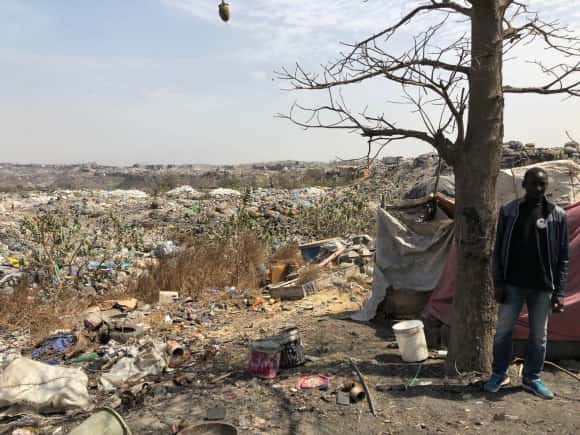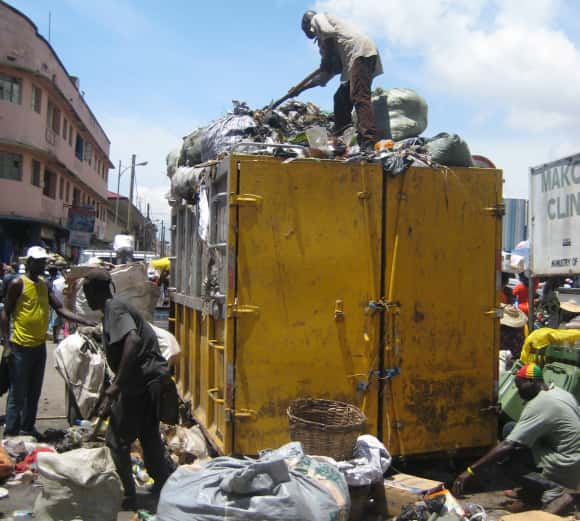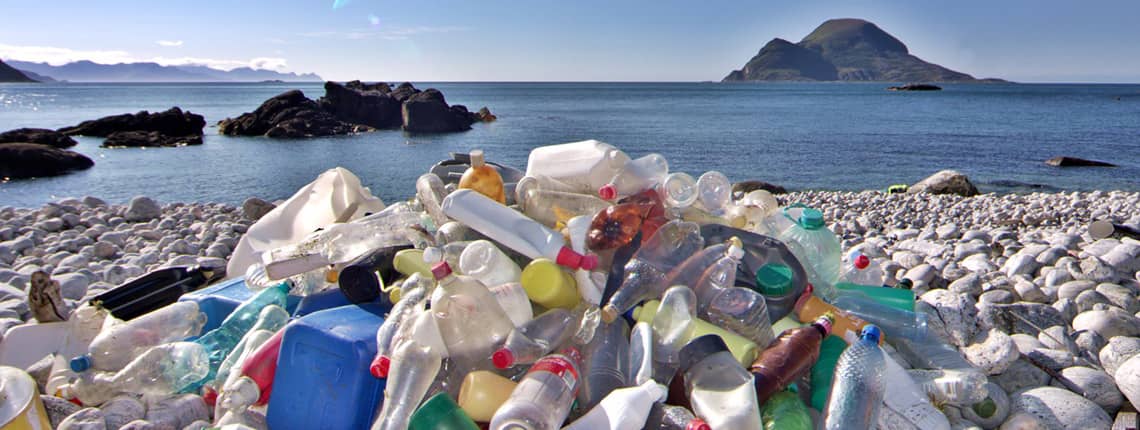A Q&A with Taylor Cass Talbott
It’s hard to miss the shocking images of heaping plastic floating in the middle of the world’s oceans on the covers of magazines and on the evening news. The photos and reports have raised alarm bells with both citizens and policymakers alike. The ocean plastic waste issue is one of the most significant crises of our times — and one we believe waste pickers can play a significant role in solving.
Waste pickers are informal recyclers who make a living off of collecting, sorting and recycling waste for profit in cities rich and poor, but play an especially significant role in the Global South, where municipal waste management is often inadequate to meet urban needs. In coastal cities, waste pickers not only play a role in keeping the cities clean but also in reducing the amount of plastic heading into the ocean.
In coastal cities, waste pickers not only play a role in keeping the cities clean but also in reducing the amount of plastic heading into the ocean.
Through WIEGO’s newly launched Reducing Waste in Coastal Cities (RWCC) initiative, with support from the Swedish International Development Cooperation Agency (SIDA), we are working with waste picker organizations in select coastal cities to increase awareness of the role waste pickers can and do play in reducing ocean plastic waste and, importantly, to strengthen waste picker organizations to be more effective at it along the way.
Plastic in our world, however, is not a simple subject, with waste exported globally from rich countries to poor, with unimpeded growth of plastics production, and with industry intervening in attempted policy responses. We unravel some of these issues with WIEGO’s new Reducing Waste in Coastal Cities Project Officer, Taylor Cass Talbott, and talk more about the RWCC initiative and about the challenges and potential of involving waste pickers in tackling this global crisis.
Read more about WIEGO's work with waste pickers around the world.

What are the aims of the new Reducing Waste in Coastal Cities initiative?
The Reducing Waste in Coastal Cities (RWCC) project is highlighting and increasing the contributions of waste pickers in the reduction of ocean plastics around the world. To do this, we are supporting waste picker organizations in several coastal cities — Accra, Ghana; Buenos Aires, Argentina; and Dakar, Senegal — to increase their voice and their waste-recovery capacity. By strengthening their organizations, our goal is to help waste pickers integrate themselves into more formalized municipal solid waste management systems.
What role do waste pickers play in the fight against ocean plastics?
The informal waste sector is responsible for recycling and reusing huge quantities of materials around the world, diverting them from waterways and dumpsites where materials and their toxins make their way to the ocean.
Often, waste pickers represent the only form of waste management in a city. But it’s important to understand, too, that some waste pickers end up with non-recyclable residual materials that need to be disposed of. Without the financial or infrastructural resources for disposing of materials responsibly, those materials can end up in the environment.
The Reducing Waste in Coastal Cities (RWCC) project is highlighting and increasing the contributions of waste pickers in the reduction of ocean plastics around the world.
We know that the capacity of waste pickers to recover materials and responsibly dispose of the non-recyclable residuals is increased when waste pickers are integrated into more formal solid waste management systems. The road to formalization for waste pickers can look like municipal contracts for household collection and recycling; the provision of collection, sorting, and storage infrastructure; support for capacity building; and social protections, such as health care and childcare.
Furthermore, when waste pickers are organized, they can more easily be contracted to perform the kinds of specialized services needed to combat ocean plastics, like mass outreach and education, as well as collection services in hard-to-reach settlements that can’t afford waste management services.
Watch a video about the benefits waste pickers provide to the cities they work in.
What are some of the challenges you see for waste pickers in the face of the ocean plastics crisis?
The ocean plastics crisis is compelling governments, aid agencies and companies to invest heavily in the formalization of waste management systems, which is causing major, rapid disruptions in the sector. That’s good — we need disruption to improve these systems. But we need disruptions that support economic justice by integrating and protecting vulnerable workers.
The road to formalization for waste pickers can look like municipal contracts for household collection and recycling; the provision of collection, sorting, and storage infrastructure; support for capacity building; and social protections, such as health care and childcare.
The ocean plastics crisis is also sparking a record number of policies to regulate plastics around the world. Without proper input from waste pickers, these policies can be a slick way for more powerful actors to displace vulnerable workers and capture waste-processing markets.
So often, the strategy is to displace the informal sector with large, private firms and technologies that are typically more expensive, worse for the environment, employ fewer people, and consolidate wealth rather than distribute it to more people.
Where do you see waste pickers playing a bigger role in the solution to this global crisis?
I see waste picker organizations playing an important role in revealing how traditional responses to environmental problems like waste are actually creating more exclusionary and unequal economic systems. By attempting to solve one problem, we are creating another. If people can understand this reality, they will hopefully also realize that we need major reform in waste management around the world, and that new systems must be inclusive.
What is the RWCC project doing to elevate the role waste pickers can play?
In addition to strengthening organizations through training and facilitation of global exchanges for waste pickers to see other models, we are working with waste picker groups to study and contribute to the global and regional plastics policy landscape so that waste picker inclusion can be sustained institutionally.
There are so many new technologies being tested to solve the issue of ocean plastic waste. Why should policymakers look to waste pickers when there are these potential silver-bullet alternatives?
There are many new technologies coming out, including massive boats that suck up ocean plastic along with anything else living among the plastic. These technologies are controversial among scientists and environmentalists, and also fail to address the root of the problem. We urgently need to improve waste collection and management around the world, and waste pickers are in the best position to do this, if they are properly accepted and supported.
We urgently need to improve waste collection and management around the world, and waste pickers are in the best position to do this, if they are properly accepted and supported.
We also need to reduce, or even better eliminate, the production of single-use plastics. That may seem counterintuitive in the context of waste pickers, who rely on materials for recycling, but most single-use plastic is not recyclable. And much of the plastic that is recyclable holds so little value that many countries are now in a global race to ship these materials abroad and process them in places with the cheapest labour and the laxest environmental oversight.
The global waste trade floods markets with these materials, lowering their value in receiving countries and hurting waste pickers. And, of course, the poor disproportionately suffer from resultant environmental pollution.
Policymakers should be listening to the most vulnerable workers within these systems, who can lead them to solutions that are both environmentally and economically just.

Where is the RWCC project currently happening and what are some of the strategies being employed there?
In Buenos Aires, Argentina, the Argentine Federation of Waste Pickers and Recyclers (Federación Argentina de Cartoneros, Carreros y Recicladores) is a model waste picker organization that has integrated 6,000 workers into formal recyclable waste collection and processing.
The RWCC project is supporting them in transforming the recycling practices of 1,000 waste pickers, who currently collect materials and sort them in their own homes, creating micro-landfills in their neighbourhoods that leak into the environment. To eradicate these practices, the project will incorporate these workers into a system that sorts and stores materials in a processing plant, in which non-recyclable residuals are appropriately managed.
Policymakers should be listening to the most vulnerable workers within these systems, who can lead them to solutions that are both environmentally and economically just.
The Federation already has considerable political power in Argentina and, to further incentivize responsible plastics management, has developed an extended producer responsibility bill to fund the recovery of plastic packaging. It has also been conducting regular beach cleanups and plastics-reduction awareness events along the country’s coastline, sometimes partnering with organizations like Greenpeace.
In Dakar, Senegal, the 1,590 members of the Bokk Diom waste picker association from the Mbeubeuss dumpsite, which sits near the ocean, are already recycling and reusing a significant amount of the city’s waste. They are removing the types of materials from the dumpsite that otherwise poison groundwater and marine habitats.
As they build their capacity, especially among women, they are developing a household waste-segregation pilot project to help waste pickers, authorities, the municipality and local schools propose a system that formally integrates waste pickers. The pilot targets communities near the coast and along waterways.
They are also building their capacity to advocate for proper sorting and recycling facilities, which would enable them to recover more material and process it in a healthier manner. And, interestingly, they are also exploring a partnership with local fishermen to establish a system for collecting and recycling broken fishing equipment like plastic nets.
Especially among women, [Dakar waste pickers] are developing a household waste-segregation pilot project to help waste pickers, authorities, the municipality and local schools propose a system that formally integrates waste pickers.
Accra, Ghana, is a city with recurrent incidences of flooding, which is exacerbated by poor solid waste management — particularly of plastic waste. As a result, a significant amount of plastic waste enters the ocean with serious implications for marine life, the environment and public health. Consequently, the government of Ghana and other stakeholders are implementing various strategies and policies to address the challenges of poor waste management.
WIEGO is supporting informal waste pickers to strengthen their organizations and increase the collection rates of plastics in communities and landfill sites. We have also been working with waste pickers to provide recommendations on the country’s draft Plastics Policy. So often these types of policies end up harming waste pickers by institutionalizing systems that benefit big business and exclude waste pickers, and actually reduce recycling rates. But, so far, policymakers seem to be listening.
This year, we will also be expanding to some coastal cities in India that lack formal waste management systems. Waste picker groups there will work to establish door-to-door waste collection, first targeting communities along the coast and near waterways.
Read more about waste pickers in Senegal and watch a video about a waste picker in South Africa.
How will you measure success over the course of the next two years?
We are looking to see if the organizations themselves strengthen and are able to help establish and integrate themselves more effectively into formal waste management systems.
We are tracking whether new policies support waste pickers as a result of advocacy launched through the project. We are even developing a methodology to calculate the greenhouse gas emissions offsets of informal waste picking, because such data helps waste picker groups justify their inclusion to policymakers.
And, finally, we are tracking the discussion around ocean plastics both in our target countries and abroad, because waste picker groups are largely absent from these discussions and it’s important that funders and policymakers see them not as a problem but as a solution.
Read about WIEGO's new Reducing Waste in Coastal Cities through inclusive recycling project.
